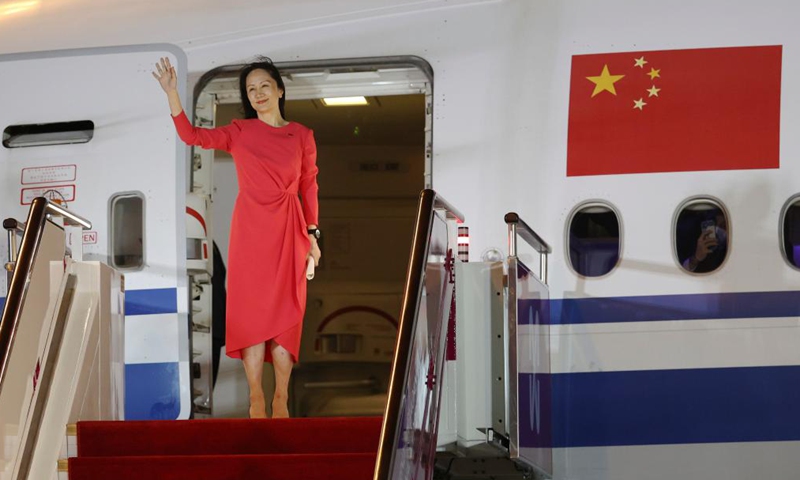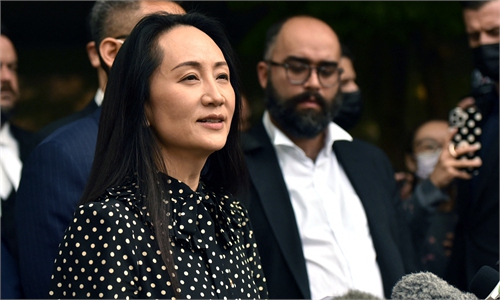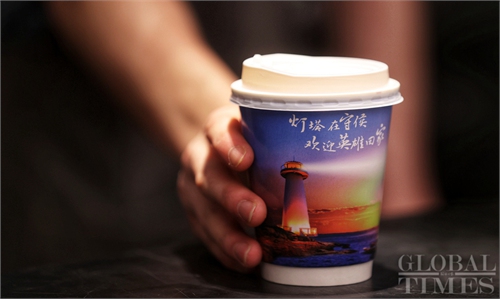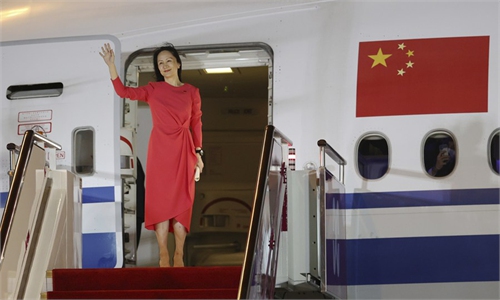Meng Wanzhou's return to China applauded by Japanese netizens who compare it with Japan's surrender to US' oppression 30 years ago

Meng Wanzhou waves at a cheering crowd as she steps out of a charter plane at Shenzhen Bao'an International Airport in Shenzhen, South China's Guangdong Province, September 25, 2021. Photo: Xinhua
Meng Wanzhou's return to China on Saturday after nearly three years in detention in Canada has been applauded by Japanese netizens, who compared her return with Japan's quick surrender to the US' oppression over 30 years ago. Some believe that if Japan had made continued efforts like the Chinese government, the situation would be different nowadays.
An expert in international affairs told the Global Times that in order to serve the US' strategy, the Japanese government has sacrificed the most fundamental economic interests of its people, which is a total tragedy. If Japan would have been able to fight as courageously as China back then, today Japan might have an important role in the global politics and economy, instead of being generally regarded as a vassal state of the US.
Meng's return to China has triggered heated discussion on Japanese social media.
"China really has powerful national strengthen! Although there is no specific content from the judicial side, this time the US is a complete failure! 'This is not the way to deal with Chinese people' will surely become a buzzword this year," said one netizen.
"Three years of illegal detention[...] Huawei is not the second Alstom. The Earth is not a place where the US can do whatever it wants," said another.
Some Japanese netizens started to reflect that, if Japan could fight to the end like China when it faced trade disputes provoked by the US, perhaps it would not have fallen into the "lost thirty years" and its diplomacy, economy, trade and even national power would be very different from today.
"This reminds me of Toshiba and Alstom. At that time, if Japan could have made unremitting efforts to negotiate like China, how strong would the Japanese semiconductor [industry] be today?" asked one netizen.
"Frédéric Pierucci, former Alstom's executive who was arrested, later published the book The American Trap. However, the Japanese were completely unaware of themselves as victims," said the netizen.
In the early 1980s, there was sharp increase in the US fiscal and foreign trade deficit. In order to enhance the competitiveness of its exports, the US forced Japan to sign the Plaza Accord in September 1985 to ease the imbalance in international payments of the US by propping up the yen and weakening the dollar.
The Plaza Accord led to a bubble economy in Japan that fell into a long-term economic downturn in the decades after.
Japan's semiconductor industry was in full bloom in the 1980s with government support before it was grounded by the US. It had surpassed the US as the world's largest chip supplier.
Toshiba, Japan's leading chip producer at that time, was targeted by the US over "national security concerns."
After Toshiba and Norwegian military enterprise, Kongsberg Våpenfabrikk, were found in 1986 to be secretly selling sophisticated milling machines to the Soviet Union, Washington issued a 2 to 5 year ban on all Toshiba Corporation products, saying the sale to the Soviet Union had posed a threat to US national security.
Two of its executives were sent to jail. The company spent some 100 million yen ($950,000) on advertising in almost all major US newspapers apologizing for its actions.
"Japanese public opinion shows that more Japanese are becoming aware that the relationship between Japan and the US is not equal and that the US can arbitrarily suppress Japan in various aspects, politically, militarily, economically and in other aspects," Lu Yaodong, a researcher of the Institute of Japanese Studies at the Chinese Academy of Social Sciences, told the Global Times on Sunday.
"Seeing the unremitting efforts that the Chinese government has made behind Meng' return to China, the dissatisfaction among the Japanese people against the government was aroused even stronger," Lu said.
"When the US launched a trade war with China, there were also arguments that China would be the one to make concessions, just like Japan," Lu said. But the fact is that "withdrawing the extradition request for Meng Wanzhou" was one of the two items put forward by China to the US during the bilateral talks in Tianjin in July, which proves that it is the US who is making concessions this time.
"Japan's economic and technological advantages continued until the 1990s. If Japan was brave enough to confront the US during the Japan-US trade war and insisted on taking the road of independence, it would certainly have achieved rapid development far greater than today's dependence on the US," Li Haidong, a professor at the Institute of International Relations of the China Foreign Affairs University, told the Global Times on Sunday.
"Independence on trade is closely related to autonomy at the strategic level. Japan's dependence on the US might be reduced across the board [if it would have confronted with the US back then], which would have resulted in a situation where Japan has a final say on its economy, security, and other fields," Li said.
Unfortunately, the Japanese policymakers at the time sacrificed their own national interests to meet the strategic needs of the US, leading to a total tragedy, Li added, noting that today Japan is still following the US' lead.



